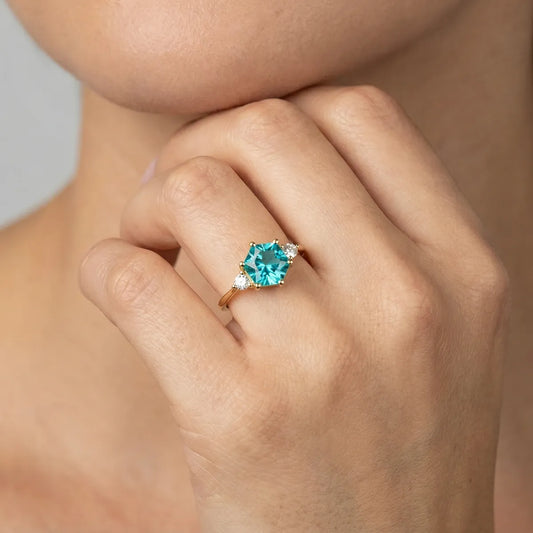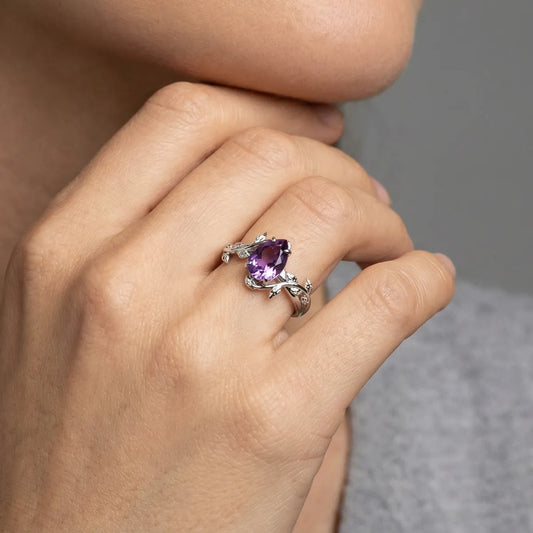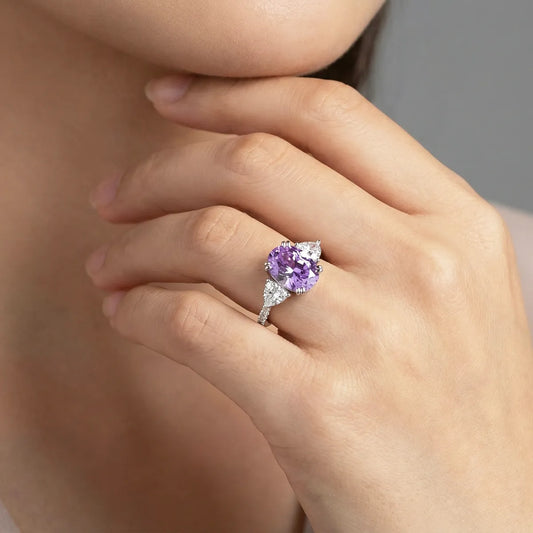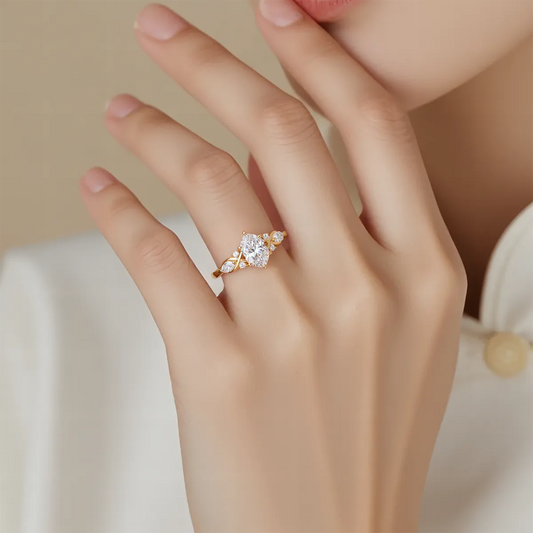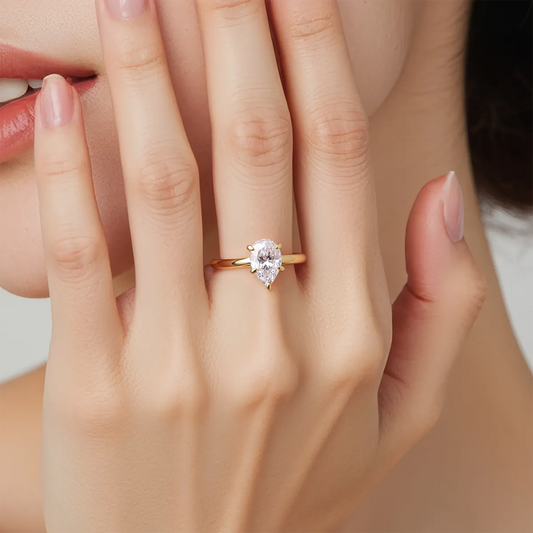The Meaning Behind Giving a Necklace as a Gift
Share
Gift presentation is an eternal tradition that has exceeded culture, religion and history. It is a universal language that is able to express emotions whose words sometimes cannot.
Among the most precious and symbolic gifts that people can give, the necklace stands out with its beauty, intimacy and meaning. Whether it is a simple chain or a carefully made pendant, the necklace's behavior is of deep importance. In this article, we will explore the layers of meaning behind necklace giving, its cultural significance and symbolic messages in different contexts.

The Necklace: A Symbol of Connection and Affection
A necklace, worn close to the heart, is an intimate piece of jewelry. The very act of placing something around someone’s neck can be a gesture of care, protection, and love. When a person receives a necklace, it becomes a constant reminder of the giver, worn daily and seen frequently. This physical closeness of the gift is symbolic, as the necklace sits near the heart, the seat of emotions. It promotes a sense of connection between the giver and the receiver, a constant link through the tangible presence of the necklace.
1. Romantic Significance of Giving a Necklace
When a necklace is given as a gift on a romantic occasion, it often becomes a symbol of love, commitment and trust. This is especially evident in the way necklaces are exchanged during meetings, engagements or anniversaries. In many relationships, necklaces are a physical manifestation of emotional intimacy, a lasting and valuable way to express feelings.

A Sign of Commitment: When one partner gives the other a necklace, it often represents a commitment to the relationship. The giver is expressing their desire for the relationship to grow, and the necklace becomes a promise of that future.
Enduring Love: Just as necklaces are made from durable materials such as gold, silver, or gemstones, they symbolize love that will endure over time. Many people choose necklaces that feature infinity symbols, hearts, or lockets to represent the unbreakable nature of their bond.
Precious moments: Personalized necklaces, such as birthstones, initials or important dates, can commemorate special moments in a relationship. These personal touches transform the necklace into a unique moment that symbolizes a shared memory between two people.
2. Necklaces as Tokens of Friendship
Not all necklaces are given in romantic contexts. Necklaces are often exchanged between friends as tokens of loyalty, trust, and appreciation. The act of gifting a necklace in friendship is a way of saying, "You are important to me, and I value our relationship."
Friendship Necklaces: Often, friends exchange matching or complementary necklaces as a way to symbolize their bond. For example, one friend may wear one half of a heart pendant while the other wears the other half. This represents how their connection completes each other.
Celebrating Milestones Together: Necklaces are often exchanged to celebrate important life milestones such as graduations, promotions, or birthdays. When a necklace is given to a friend, it becomes a symbol of shared experiences, growth, and the mutual support that defines a strong friendship.

3. Necklaces in Family Relationships
In familial contexts, necklaces can hold generational meaning and often become heirlooms passed down through the family. Mothers give necklaces to daughters, grandmothers to granddaughters, and sometimes these pieces of jewelry are kept as cherished keepsakes to remember loved ones who have passed.
Family Heirlooms: Necklaces can carry with them the history and heritage of a family. When a necklace is passed down from one generation to another, it often symbolizes continuity, tradition, and the values that bind a family together. Heirloom necklaces may include family crests, religious symbols, or even historical gemstones that have significant meaning.
Mother-Child Connection: For mothers, giving a necklace to a daughter is a deeply symbolic act. The necklace may represent the strength of their bond, the mother's protection, and the unspoken guidance passed from one generation to the next. Similarly, children often give necklaces to their mothers as a token of gratitude and love.

4. Cultural and Religious Significance of Necklaces
Necklaces have been worn for thousands of years and their meaning varies greatly across cultures and religions. In many societies, a necklace is more than just an ornament, it is also a symbol of spiritual protection, status or moral value.

Religious Symbolism: In many cultures, necklaces bear religious symbols like crosses, stars, or other sacred icons. For example, Christians may wear necklaces with crosses to symbolize their faith, while others wear pendants representing different religious figures or symbols. Gifting such a necklace is not only an act of affection but also an affirmation of shared beliefs and values.
Good Luck and Protection: In certain cultures, necklaces are believed to offer protection from harm. For instance, in some Eastern cultures, necklaces with specific stones or symbols are believed to ward off evil spirits or bad luck. Gifting such a necklace can be seen as a gesture of protection and care, indicating the giver's desire for the well-being and safety of the recipient.
Symbol of Status and Wealth: Historically, necklaces were also worn to signify wealth, power, and social status. In ancient Egypt, for instance, elaborate necklaces made of gold and precious stones were worn by royalty and were believed to carry divine energy. While the significance of status has evolved, gifting an expensive necklace can still be a gesture of admiration and respect.
5. Necklaces as Markers of Personal Transformation
Another meaning of necklaces is their association with personal transformation and growth. Giving a necklace can symbolize the giver's appreciation for an important moment in the recipient's life, such as a new job, graduation, or an important personal achievement.

Graduation and Achievements: Necklaces are often used to commemorate important life milestones. Young people can receive a necklace when they graduate, start a new career or achieve a big goal. These necklaces usually have a symbol of success or personal growth, such as compass (instructions), trees (for growth and stability) or stars (to realize the dream).
New Beginnings: Necklaces can also symbolize the beginning of a new chapter in life, such as moving to a new city, starting a new job, or beginning a new relationship. In this context, the necklace becomes a symbol of encouragement and hope for the future, a reminder of the giver's support and love.
6. The Modern Meaning of Necklaces in Gift-Giving
In today’s society, necklaces remain a popular and meaningful gift. While many traditional meanings persist, modern gift-giving has introduced new layers of significance. For instance, necklaces have become a way of expressing one’s identity, with many people choosing pieces that reflect their personal style, beliefs, or passions.

Self-Expression: Necklaces are now seen as a form of self-expression. Many people choose necklaces that reflect their personality or interests, such as zodiac signs, initials, or symbols from popular culture. When gifting a necklace in this context, the giver is showing that they recognize and appreciate the uniqueness of the recipient.
Sustainability and ethical choices: The development of sustainable and ethical fashion in recent years has also influenced the gifting of jewellery. People are becoming more aware of the environmental and ethical impact of their purchases, resulting in an increase in environmentally friendly and ethically sourced jewelry. Giving a sustainable necklace can be a statement of shared values, showing concern for both the recipient and the planet.
Conclusion
The simple act of giving a necklace as a gift is imbued with a rich tapestry of meanings. Whether it represents love, friendship, protection, personal growth, or spiritual connection, a necklace is far more than just an adornment. It is a deeply personal and symbolic gesture, capable of conveying emotions and messages that transcend words. From ancient times to the modern day, the necklace remains one of the most cherished and meaningful gifts, symbolizing the bonds that unite us in love, friendship, family, and shared values.
Whether you are giving a necklace to a romantic partner, a dear friend, or a family member, the thought and care behind the gesture shine through, making it a gift that is truly unforgettable.




